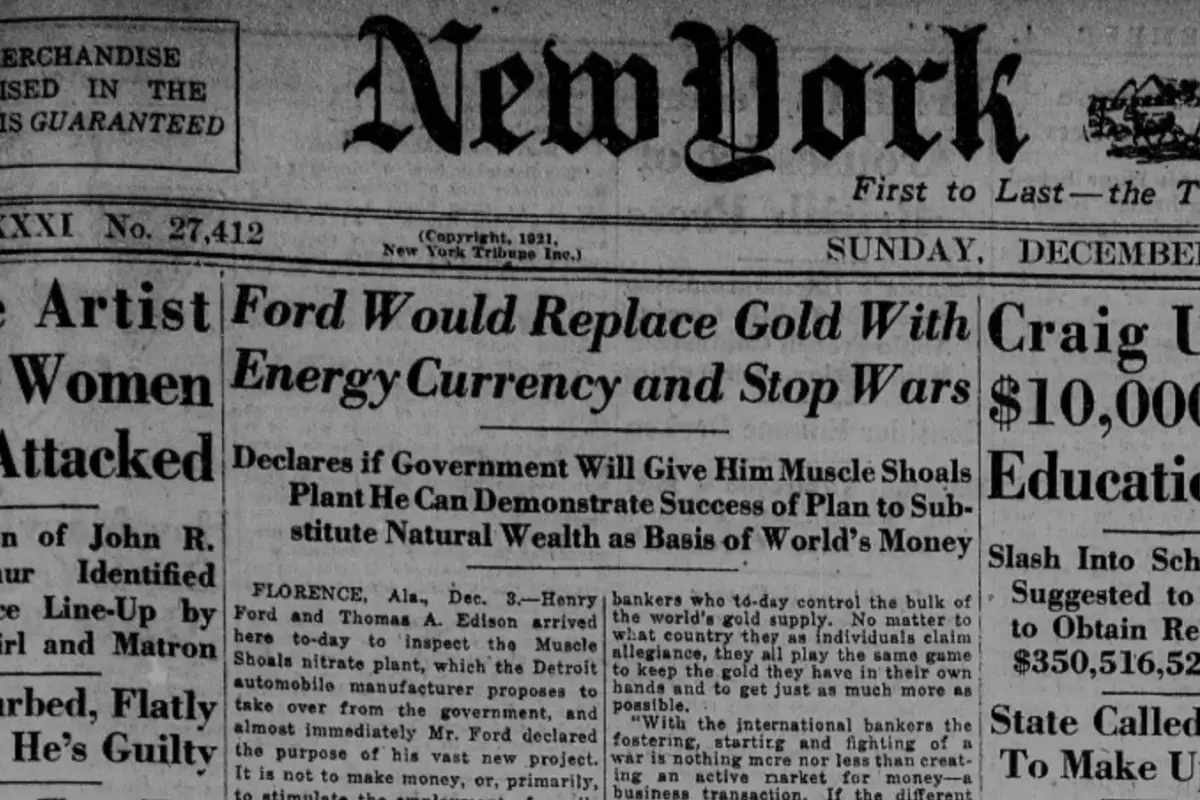Bitcoin is Henry Ford’s Energy Currency

Ford’s Energy Currency
99 years ago, Henry Ford, one of the greatest businessmen of all time, planned the development of an “Energy Currency” to replace gold. Ford’s goal was to end wars which he argued were centered around the control of money:
“The essential evil of gold in its relation to war is the fact that it can be controlled. Break the control and you stop war.”
New-York Tribune, 1921
Ford proposed an energy backed currency would stop wars because every country could issue currency backed by their “imperishable natural wealth” of energy resources, such as the US Muscle Shoals Dam.

Bitcoin meets Ford’s definition for an energy currency
When asked “Have you worked out a standard of value?”, Ford responded:
“Under the energy currency system the standard would be a certain amount of energy exerted for one hour that would be equal to $1.”
Ford suggested a currency backed in kilowatt hours (kWh) and this is exactly what was found for Bitcoin in Bitcoin’s Energy-Value Equivalence – Bitcoin is “backed” by energy input.
For the last 10 years, 80% of Bitcoin’s price history is explained by a 1-to-1 constant value against energy input. Like all markets, price fluctuates around value. But price and value are intrinsically linked and mean-revert. Bitcoin has a fixed value through time based on the mining energy exerted and its supply growth rate.
Ford also envisaged a fully backed currency:
“Mr Ford proposes that this currency be issued only to a certain definite amount and for a specific purpose.”
In other words, you could only issue more energy currency if you put more energy-in, and this is exactly what Bitcoin does. All else equal, the more energy you put in as an individual miner, the more freshly minted Bitcoin you will receive. On the other hand, the more energy that all other miners put into mining Bitcoin the more difficult, and costly, it is for you to mine Bitcoin.
Bitcoin’s value using Ford’s energy standard
In Bitcoins Energy-Value Equivalence, Bitcoin’s value is expressed in “Joules” of energy, but it can just as readily be expressed in “kWh” as dreamed of by Ford.
As 1 kWh = 3.6 million Joules, if energy input and supply growth rate are measured in kilowatts and hours respectively, Bitcoin’s Fiat Factor ($/kWh) becomes:
7.2E–9
Given today’s (20 January 2020) supply growth rate, Bitcoin’s Energy Value can be expressed in kWh as:

Today, the Bitcoin network is consuming approximately 6.9 million kWh of energy, so one Bitcoin is worth almost $12,000.
Said equivalently, 1 Bitcoin today is backed by 1.66 trillion kWh of energy and growing.
Bitcoin is unique as it has an exponentially decreasing inflation rate. Under constant conditions, for any individual Bitcoin Miner more energy is required in the future to produce the same amount of Bitcoin as today. This makes the Supply Growth Rate a critical component of Bitcoin’s Energy Value.
Because Bitcoin’s Supply Growth Rate is decreasing, and will drop substantially with the halving in May 2020, the above “V-today” value will effectively double over the next year. Some simple math will tell you what that means for Bitcoin’s intrinsic value.
Bitcoin’s energy “backing” is growing exponentially. As a result, it is likely we continue to see the hyperinflation of the US Dollar, and all fiat currencies, against Bitcoin until this trend stops.
It didn’t work out for Ford
In the 20th century, there was no way to accountably and immutably link the value of energy to a unit of currency. Further, there was no motivation for the establishment to even consider a “energy currency” system which could make their existing sources of wealth and power redundant and would certainly remove their ability to pull the levers of monetary policy.
We know that Ford’s plans didn’t eventuate. After three years of unsuccessfully bidding for the Muscle Shoals Dam to kick start the project, he abandoned the plans in 1924 stating:
“A simple affair of business which should have been decided by anyone within a week has become a complicated political affair.”
This is not surprising. Many years later in 1984, Austrian economist Friedrick Hayek noted:
“I don’t believe we shall ever have a good money again before we take the thing out of the hands of government. That is, we can’t take it violently out of the hands of government, all we can do is by some sly roundabout way introduce something that they can’t stop.”

Hayek pled for the denationalization of money, believing monetary policy has not done any good, only harm. The full interview with Hayek is well worth a watch.
The 21st century energy currency
Today, an energy backed currency run by the people, which is immutable by any individual organization, can make Ford’s “Energy Currency” and Hayek’s “Good Money” a reality.
To date, Bitcoin has found a way around politics. It has predominantly evaded it and continued to grow in distribution, security and adoption. The longer this journey continues, the harder it becomes for any individual country to stand against Bitcoin — enhancing its “Lindy effect”:
“The Lindy effect is a theory that the future life expectancy of some non-perishable things like a technology or an idea is proportional to their current age, so that every additional period of survival implies a longer remaining life expectancy.”
Wikipedia
Of course, there are many risks facing Bitcoin. These have been discussed at length in the past. The market has weighed the risks and opportunities, and the current decision is reflected by a growing Bitcoin Energy Value.
As long as mining energy continues to increase, Bitcoin is executing a silent takeover of fiat currencies. In fact, despite a 2-year bear market, Bitcoin’s energy value, and hence the network’s security and intrinsic value, is at a new all-time high as of 20 January 2020.

[Live metric available on TradingView here]
The Energy Standard
Ford was a century ahead of his time. We now know that an energy backed currency can work.
In 1921, Ford posits some advice for the skeptical:
“It’s simply a case of thinking and calculating in terms different from those laid down to us by the international banking group to which we have grown so accustomed that we think there is no other desirable standard.”
Bitcoin is money backed by energy. Welcome to The Energy Standard.
Disclaimer on Backtests
Any Backtest performance returns presented represent hypothetical returns and are meant to simulate how a strategy would have performed during the period shown had the strategy been implemented during that time. Backtested/simulated performance returns are hypothetical and do not reflect trading in actual accounts. Backtest returns are provided for informational purposes only to indicate historical performance had the strategy been implemented over the relevant time period. Backtested performance results have inherent limitations as to their relevance and use. One of the limitations of hypothetical performance results is that they are generally prepared with the benefit of hindsight. In addition, hypothetical trading does not involve financial risk, and no hypothetical trading record can completely account for the impact of financial risk in actual trading, such as the ability to withstand losses or to adhere to a particular trading program in spite of trading losses, all of which can also adversely affect actual trading results. There are numerous other factors related to the markets in general and to the implementation of any specific trading program which cannot be fully accounted for in the preparation of hypothetical performance results, all of which can adversely affect actual trading results. Any and all of these factors mean that no representation is being made that strategies presented here will achieve performance similar to that shown, and in any case, past performance is no guarantee of future performance.




